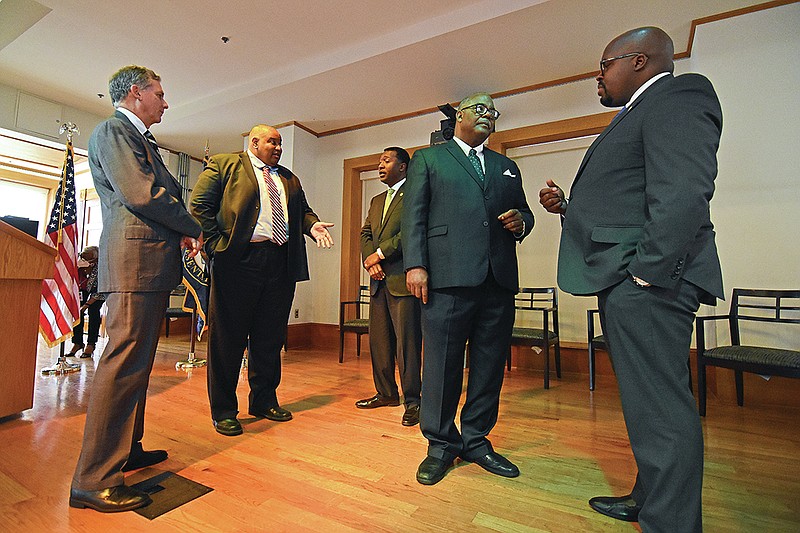U.S. Rep. French Hill announced that he would reintroduce a bill to Congress aimed at providing educational and other support to people getting out of prison to help them lead productive lives once they are back in society.
The bill, called the Shift Back to Society Act, failed to pass in three Congresses. Hill said he hopes that changes to the legislation, including bipartisan co-leadership and placing the program under the purview of the U.S. Department of Education, will make it successful this go-round.
Previously, the bill was placed under control of the U.S. Department of Justice.
Hill announced the updated version, which includes annual funding of $5 million, during a news conference Friday afternoon at Arkansas Baptist College in Little Rock.
The Shift Back to Society Act would provide funding in the form of grants from the Department of Education to historically Black colleges and universities, or HBCUs, to develop innovative educational programs to help criminal offenders transition back into communities.
Hill, a Republican, plans to introduce the updated bill this week during a pro forma session of the U.S. House of Representatives.
"We need people reunited with their families, with their kids, reunited with the dignity and success of work and reunited with their faith," Hill said. "All of those things take a bad turn in prison."
Co-leadership of the measure includes U.S. Rep. Terri Sewell, D-Ala., Rep. Steve Cohen, D-Tenn., and Rep. Mike Turner, R-Ohio.
People who would qualify for the program would have been convicted of a criminal offense and been released from prison for no more than one year or are scheduled to be released within a year.
The legislation would complement the Second-Chance Pell Grant and other state and federal programs that focus on education as a key component of reducing prison recidivism, Hill said.
The program offers Pell grants to inmates, allowing colleges to provide some classes to them while they're incarcerated. North Little Rock's Shorter College is a participant.
The Second-Chance Pell Grant pilot program was created under President Barack Obama's administration in 2015. At the end of July, the Department of Education announced that it would expand the program for the 2022-23 award year, allowing up to 200 colleges and universities to offer prison education programs, an increase from 131 currently participating.
"I expect over the next few years that the [Second-Chance] program will continue to grow and be made permanent," Hill said. "It is working, and it is seeing measurable drops in recidivism through participation."
Research from Rand Corp., a nonprofit think tank, found that inmates who "participate in correctional education programs had 43% lower odds of recidivating than those who did not."
"The odds of obtaining employment post-release among inmates who participated in correctional education was 13% higher than the odds for those who did not participate in correctional education," the 2013 Rand study found.
Hill said that he believes the legislation he hopes to pass would complement the Second-Chance program, allowing colleges and universities the flexibility to test strategies for working with inmates to see what has the most impact.
"It is a pilot program," the congressman said. "It is meant to encourage innovation on tackling this issue...about trying something new or different that fits your community."
Leaders from a number of Black colleges and universities in Arkansas attended Friday's event as well as Solomon Graves, secretary of the Arkansas Department of Corrections.
Graves said there are currently 80,000 people in state prisons.
Of those, about 10,000 are released annually.
"The Shift Back to Society Act will facilitate successful transitions to employment and successful transitions back to this community," Graves said. "It lines up with our core values and our mission statement in the department, which emphasizes issues related to public safety, accountability and rehabilitation."
Graves said 400 state inmates are pursuing postsecondary education. For inmates who do not graduate from high school, it is a requirement that they pursue their equivalency diplomas while in prison.
"These college partnerships make complete sense for us as we continue our mission of being a public safety and rehabilitative resource for the state," Graves said.
"We know there is more than one man, more than one woman incarcerated right now in my facilities and facilities across this nation who need salvation, who need support," Graves said. "This act would allow us to reach those ones until we have communities that are ready to change the world."
"This legislation will have a great impact on the state of Arkansas as well as the nation," said Robert Carr, provost and vice chancellor of academic affairs at the University of Arkansas at Pine Bluff. "There are hundreds of thousands of people who are looking for an opportunity to make a productive contribution to society."
"Unfortunately, we live in a country in which most incarcerated people are disproportionately African American," Carr said. "All of those people deserve a second chance."
When TJ West landed in prison, he had only a seventh-grade education.
West now has a college degree, a job, a house and a family. He says he was able to reclaim his life because of an Arkansas program called Pathway to Freedom, a nonprofit that provides pre-release and post-release services to inmates, including educational programs, to prepare them for reintegration into society.
West told his story during Friday's announcement.
"From adolescence into your adulthood, some of the trauma and the experiences that happen in life [means] you don't necessarily believe in yourself so much," West said. "So it is pivotal we educate and have educational programs not only inside the prisons but once individuals get released."
'I don't have to be limited by what I went through," West said. "I can do all things. I can accomplish something."
